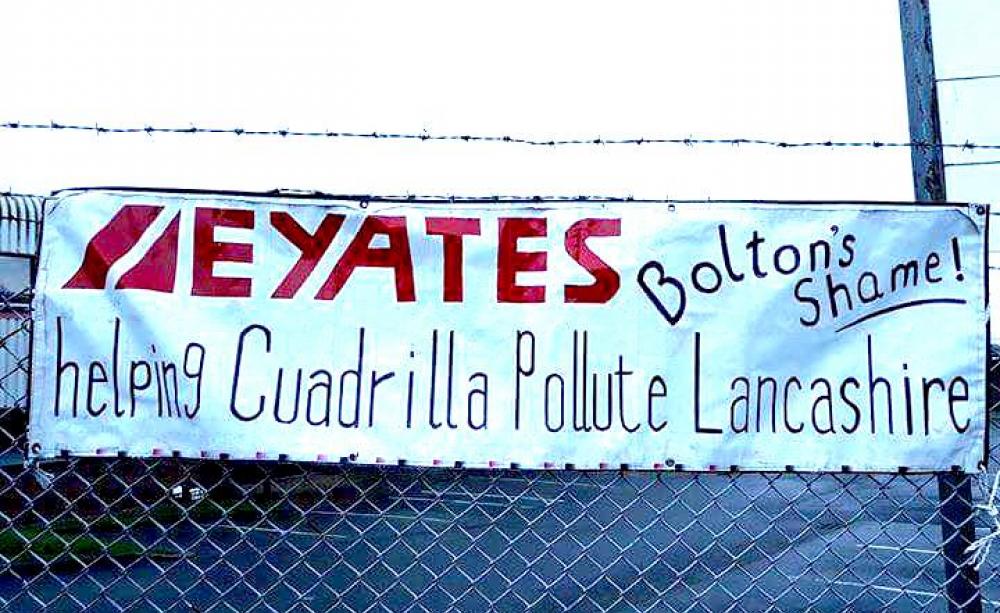x
The largest public sector pension fund in the UK has more than double the investment in the fracking industry than previously known with more than £1billion at risk, The Ecologist can reveal.
Tameside/Greater Manchester (GMPF) had by 31 March 2018 put in an extra £609m worth of holdings in companies that back fracking - which include financial, chemical, security and waste concerns. This is over and above the £700m recently disclosed.
This further investment includes £92m directed towards Centrica, a partner of Cuadrilla, the company currently attempting to frack near neighbouring Blackpool.
Managing risk
Centrica holds a 25 percent stake in the Bowland exploration licence under which Cuadrilla is operating and stands to gain from any future returns.
Kate Blagojevic, head of energy at Greenpeace UK, said: “Pension fund investment is supposed to be about managing long term risk.
"This fund has invested in a loss-making industry which looks unlikely to ever make it into the black, and can only operate by increasing the biggest long term risk we face, runaway climate change.”
Centrica acquired its 25 percent stake from Cuadrilla and AJ Lucas for £40m in cash. It also agreed to pay exploration and appraisal costs of up to £60m.
Spirit Energy, which is the Centrica-owned company listed on the licence, came about through a 2017 merger of Centrica’s exploration and production business and Bayerngas Norge AS, a European oil and gas franchise.
Other stakeholders in fracking that are backed by GMPF include the banks Barclays, Goldman Sachs, Macquarie Bank and HSBC; chemicals giant BASF; security firm G4S which provides security for Cuadrilla; oil conglomerate Total; and waste provider Northumbrian Water.
Fiduciary duty
Lancashire County Council has through its pension fund £187m invested in the fracking industry through its pension fund and it is the planning authority overseeing Cuadrilla’s operations.
Gina Dowding, a Green Party councillor at Lancashire, said: “I have been trying for five years to get a commitment to divest from fossil fuels and the arguments against have shifted over the years.”
The main argument is that of ‘fiduciary duty’, a stipulation that pension funds must always act in the best financial interests of their pensioners. This often prevents divestment from less ethical categories of funds - including arms, gambling and extreme fossil fuel extraction.
Cllr Dowding added: “This notion has been successfully challenged in the courts and it has long since been ruled that environmental, social and governance (ESG) considerations can indeed be factored into investment decision-making.”
Evidence that investments in fossil fuels will become ‘stranded assets’ in the longer term have gained enough traction to persuade some funds to divest and some big players in the US like the Rockefeller family fund have done just that.
Resisting change
Cllr Dowding told The Ecologist: “The serious prospect is that many fossil fuel investments will not ultimately be realised due to government policies preventing fossil fuels from being burned, or as renewable energy becomes cheaper compared to the costs of extraction.
"But the looming prospect of both a massive and swift fall in value of dirty oil and gas reserves, is not having an effect on market values right now to prompt immediate action.
“This means the fall back position of many pension funds is that it is far better as shareholders to engage with and influence companies to re-direct their activities and that whether pension funds divest or not other investors will fill the gap.
“In reality, experience is showing is that despite the stark warnings of the urgent need to transform to a low carbon future, the fossil fuel industry is resisting policy change, uses funds to lobby governments, and does everything in its power to keep a business-as usual context for their activities.
“For this reason I think change will and must result from pressure from campaigners targeting politicians and Government for legislation and regulation. This is a classic case of market failure, with the oil and gas sector unable to turn its self around to the necessary demands for a low, if not a net-zero, carbon future.
“Meanwhile at the very least pension funds should be adopting targets to ensure their increasing active investments in renewables outweigh and replace their passive investments in global equity stocks in oil and gas."
Gas reserves
Cuadrilla was the first oil and gas company to use high volume hydraulic fracturing for shale gas. It was these fracking activities at Preese Hall in 2011 which caused earthquakes of 1.5 and 2.3 on the Richter scale and led to a ban on fracking with operations in train once again seven years later
Although there is an estimated 200 trillion cubic feet (tcf) of gas within Cuadrilla’s Bowland Shale licence area, further drilling will be required over the next few months to establish whether this will be commercially viable.
Mark Hanafin, managing director of Centrica’s international upstream business said at the time of the licence acquisition: “With North Sea gas reserves declining and the UK becoming more dependent on imported gas supplies, it is important that we look for opportunities to develop domestic gas resources, to provide affordable sources of gas to our customers, and to deliver broader economic benefits to the UK.
“The Government’s clear commitment to developing the UK’s shale gas industry is creating the right environment for companies to invest and to deliver those benefits.”
'Divesting our holdings'
A Tameside Metropolitan Borough Council spokesperson said: "A notable addition to our work on the Pension Fund in the past financial year has been reviewing the Pension Fund’s approach to climate risk.
"We are committed to the transition to a low-carbon economy, and supporting efforts to address climate change. We continue to be the biggest local government pension investor in renewable energy.
"We have approved that £2.3bn of the Fund Assets be moved to a low carbon approach targeting a significant reduction in carbon footprint and intensity as we move on our journey to become carbon neutral.
"The Fund will continue to use its position on the Local Authority Pension Fund Forum and the Institutional Investor’s Group on Climate Change to engage with and challenge companies in which we have an interest.
"Our approach is that engagement is more effective than divesting our holdings and passing the buck on to someone else who may not share our commitment to responsible investment."
The report into UK councils investments in the fracking industry compiled by Platform London, 350.org and Friends of the Earth in September showed that GMPF had £704m invested directly in fracking companies.
See the full dataset here.
This Author
Jan Goodey is a regular contributor to The Ecologist.







